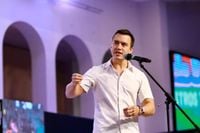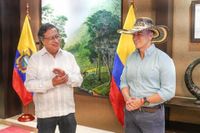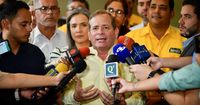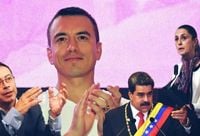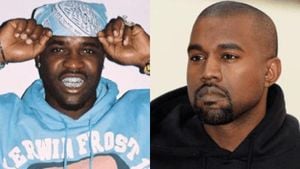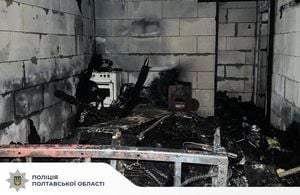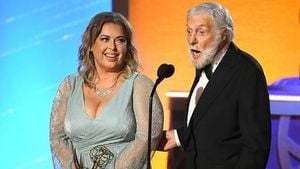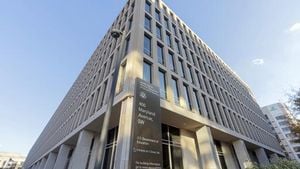In a heated exchange of words following the recent Ecuadorian presidential elections, the president of Ecuador, Daniel Noboa, and the Venezuelan dictator, Nicolás Maduro, have clashed over allegations of electoral fraud. The controversy erupted after Maduro labeled the elections as a "horrendous fraud," prompting a strong rebuttal from Noboa and other Ecuadorian officials.
On April 13, 2025, with 90% of the ballots counted, Noboa secured nearly 56% of the votes against Luisa González of the Revolución Ciudadana party, who garnered 44%. Following the announcement of the preliminary results, González claimed without evidence that the elections were marred by the "most grotesque fraud in the history of Ecuador." In response, Diana Atamaint, the president of Ecuador's National Electoral Council (CNE), defended the integrity of the electoral process during an interview with the channel Teleamazonas. "If Mr. Maduro says there was fraud, that means we are doing things right in Ecuador," she stated, emphasizing that the electoral process had been transparent and closely monitored.
Atamaint pointed out that 95,000 delegates from both political parties were accredited to observe the voting process, ensuring that it was conducted fairly. "How can we talk about fraud when both organizations had the great opportunity to oversee the process?" she questioned. She further clarified that there had been no national requests for any act to be reviewed by the Correísmo, the political faction associated with González.
In an interview with the Colombian magazine Semana, Noboa responded to Maduro's accusations, stating, "What legitimacy do the words of someone who has destroyed his country and forced millions to flee have? Maduro has no moral authority to speak of democracy." He suggested that Maduro should first ensure transparency in his own electoral processes, which have been widely criticized both domestically and internationally.
Noboa also addressed the Colombian president, Gustavo Petro, who has not yet recognized Noboa's victory. While expressing disappointment over Petro's stance, Noboa maintained a diplomatic tone, emphasizing the importance of cooperation between Ecuador and Colombia. He remarked, "I have a very good relationship with President Petro. I hope for the best for his administration for the benefit of the Colombian people." Noboa expressed his desire to strengthen bilateral ties, particularly in commercial and security matters.
On the other hand, Noboa's relationship with Mexican President Claudia Sheinbaum appears strained. Sheinbaum recently announced that her government would not resume diplomatic relations with Ecuador while Noboa remains in office, blaming him for a raid on the Mexican Embassy in Quito in April 2024. She questioned the legitimacy of the recent elections, citing a report from the Organization of American States (OAS) that acknowledged Noboa's victory but noted that the process was not entirely equitable. In response, Noboa stated, "Sheinbaum represents a continuity of policies that have led Mexico to face significant challenges. I hope she can make decisions that benefit her people."
The situation has drawn criticism from Venezuelan opposition leader Juan Pablo Guanipa, who labeled Maduro's accusations as "cynicism." Guanipa pointed out that while Ecuador published results and election records on the same day, the Venezuelan electoral authority has failed to provide evidence for Maduro's re-election amid claims of irregularities. He remarked, "Maduro talks about inauditable fraud when in Ecuador they published acts and results the same day confirming Noboa's victory. This is the height of cynicism."
Maduro has called Noboa a "dictator" and has urged the "armed people" of Venezuela to march on May 1, 2025, in a show of strength, framing it as a celebration of International Workers' Day. He asserted that Venezuela is more armed than ever to defend its sovereignty against perceived external threats. This call to arms comes amid ongoing economic challenges and increasing tensions within Venezuela, where the official dollar has surpassed 80 bolivars, exacerbating the already dire economic situation.
As Noboa prepares to take office on May 24, 2025, for the presidential term from 2025 to 2029, the political landscape in Latin America remains fraught with tension. The reactions from regional leaders highlight the complex dynamics at play, particularly as left-leaning governments grapple with the implications of Noboa's victory. The unfolding situation serves as a critical moment for Ecuador as it navigates its relationships with neighboring countries amid accusations and counter-accusations surrounding electoral legitimacy.
In conclusion, the recent Ecuadorian elections have sparked a significant diplomatic rift in Latin America, with accusations of electoral fraud being met with firm denials and calls for transparency. As Noboa embarks on his presidency, the reactions from Maduro, Sheinbaum, and Petro will likely shape the future of Ecuadorian foreign policy and its regional relationships.
